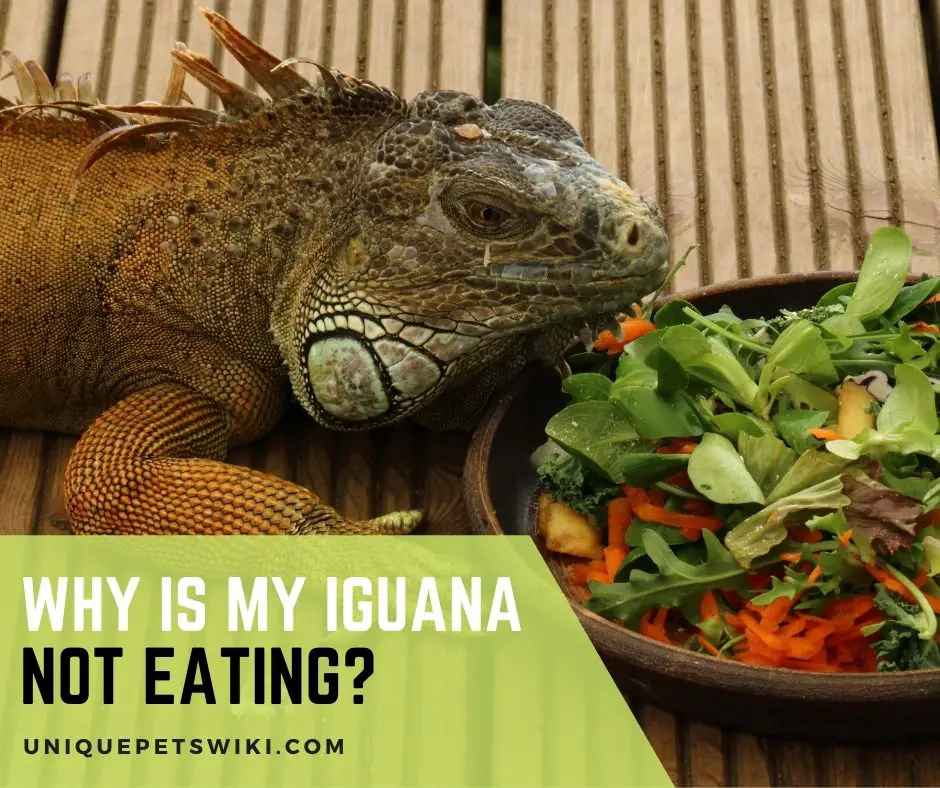One of the first things pet owners come to mind is, what to feed my pet? You might be feeling the excitement of feeding it just like the way you like petting it.
It probably gives you that indescribably pleasurable feeling to see your pet eating vigorously.
Owning a unique pet as an iguana gives you extra miles to survive, especially if you decide to consider it domestic. Are you worried that your beloved iguana is not eating?
Are you cramming to get straight facts on the reasons and solutions for this dilemma? Well, you are just in the right place.
Reading this article helps you feel at ease since it informs you of why your iguana is not eating and how to help and make them eat again.
Make your iguana live healthily by reading facts and tips here.
Contents
- Why Is My Iguana Not Eating?
- Your Iguana is Newly Adopted
- The Temperature In The Cage Is Too Cold
- Cage Size Not Suitable
- Your Iguana is Dehydrated
- Your Iguana Is About To Shed
- They Are In Breeding Season
- Your Iguana May Be Ill
- Your Iguana is Still Full
- Your iguana Doesn’t Like food.
- The Food Has Gone Bad
- Over Handling Can Stress Out Your Iguana Pet
- How Long Can Iguana Go Without Food?
- How to Help Iguana Eat Again
- Final Sentences
Why Is My Iguana Not Eating?
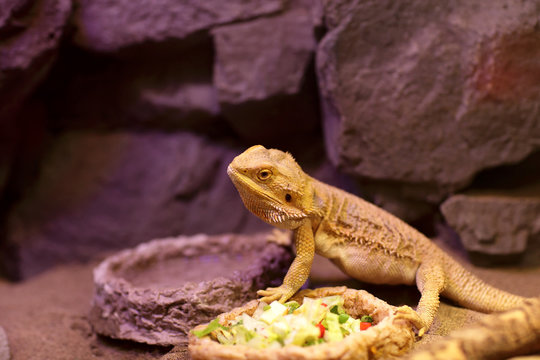
It will be okay if your newly adopted iguana is not eating. However, if failure to eat is an impulsive behavior for an assimilated iguana, you should look out for the underlying reason.
The main reasons for iguanas not eating include dropped temperatures, shedding, dehydration, stress, or even worse, illness.
It is imperative to find the underlying reason behind the sudden change to help a starving iguana start eating again.
Therefore, this section will discuss the most common reasons why your iguana may stop eating.
Your Iguana is Newly Adopted
Like most other exotic pets, it is prevalent for iguanas to get stressed when introduced to new environments. And, failure to eat is a significant sign of a stressed iguana.
Other signs of a stressed iguana due to acclimatization may include,
- Hiding
- Aggressiveness
- Failure to poop regularly.
If you just brought in a new iguana, it is critical to give it time to acclimatize to its new environment.
It takes approximately 1-2 weeks for an iguana to be acclimatized. It is necessary to ensure that you do not try to handle your iguana during this period.
Additionally, you should ensure that your iguana can observe you when performing its daily cage grooming. And, you regularly whisper to your iguana and avoid sudden sounds.
Iguanas can be very defensive. However, they can also recognize their owner’s voice and face.
Thus, be patient and always offer a new food to your iguana until they are fully tame.
Check out: Are Iguanas Aggressive To Humans? Secrets You Didn’t Know
The Temperature In The Cage Is Too Cold
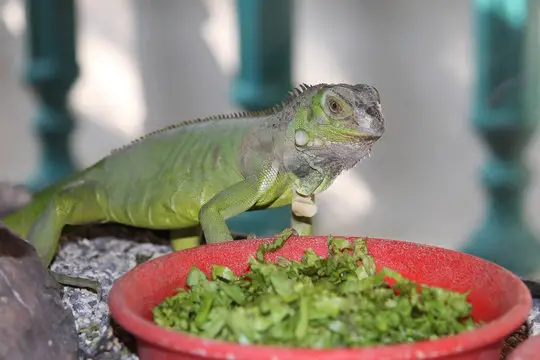
Iguanas are cold-blooded animals. Thus, they depend on the ambient temperatures to regulate their bodies.
As such, it is inevitable to provide the ideal temperature for your iguana to stay healthy and happy in captivity.
Too much cold causes indigestion in iguanas rendering them lose appetite.
Other signs and symptoms of too much cold in iguanas may include
- Indigestion
- Lethargy
- Low immunity
- Immobility
- Dehydration
- Weight loss
- Improper shedding
If your iguana suddenly stops eating, it is necessary to check their temperatures in their cage.
The ideal temperatures for iguanas should be
- 80-850F ambient temperature
- 96-1000F basking temperature
- 78-800F night temperature
- Temperature below 730F is too low and dangerous for iguanas.
Always use a digital thermometer to ensure ideal temperatures for your iguana at all times.
Cage Size Not Suitable
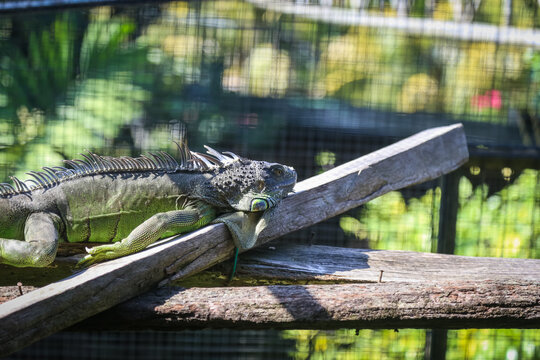
Iguanas can get quite big. Thus, it is mandatory to get a large tank for your iguana. Lack of enough space to turn and climb can cause stress to your iguana.
And, stress is a common reason for iguanas not eating. An adult iguana can grow for up to 6 feet.
Thus, an ideal size for an adult iguana should be at least 12 feet and 8 feet high.
Other symptoms of small tank size for iguana may include stunted growth, primarily due to prolonged stress.
Therefore, it would be great to provide an ideal tank for your iguana for good growth and comfort.
Your Iguana is Dehydrated
Dehydration causes constipation in every animal, including the iguanas. And, constipation leads to loss of appetite.
Thus, it is essential to keep your iguana hydrated at all times. Besides, dehydration causes multiple other health issues for iguanas.
You can tell if your iguana is dehydrated if
- Its skin seems wrinkled and puckered
- Has sunken eyes
- Sticky or dry membrane
- The iguana’s skin has no elasticity
- Weakness and lethargy
- Shedding issues
If you suspect dehydration could be the underlying reason for your iguana to stop eating, it is crucial to rehydrate by following these steps:
- Drip water into your iguana’s nostril using eye droppers.
- Place water or diluted electrolyte near the iguana’s head for it to drink
- In severe cases, consult exotic pet veterinary
Your Iguana Is About To Shed
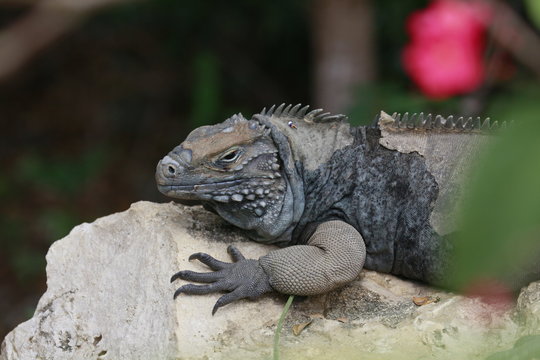
Shedding is a natural process for iguanas and other reptiles. However, it comes with its shares of trouble.
For instance, an iguana may appear lethargic and not eat during shedding. However, these shedding issues only occur when the habitat conditions are inadequate.
Poor nutrition, dehydration, and inadequate humidity and temperatures are the primary causes of shedding issues in the iguana.
Other signs of lousy shedding for iguanas may include
- Laziness or lethargy
- Loss of appetite
- Rubbing against objects
- Retained skin
For a smooth shedding process, it is imperative to provide 70% moisture in your iguana’s cage, hydrate it by offering a bath, and provide a hard object like a block of wood or bark for your iguana to rub in.
You may also help pull the retained skin gently after soaking it for at least 5 minutes, especially around the tail, mouth, spike, and nails.
They Are In Breeding Season
It’s not an easy task to breed iguanas in captivity. But, if you successfully breed your female iguana, you should beware of the consequences that tag around egg-laying in females.
For instance, the female iguana will lose its appetite four weeks before laying the eggs.
The eggs occupy massive space in their coelomic cavity, leaving no room for other stomach content.
A healthy iguana can quickly go for four weeks without eating and remain healthy.
However, iguanas with marginalized conditions can acquire serious health issues because they need a lot of calcium to form the shells.
Therefore, it would be best to breed your iguana unless you are sure they are in perfect health.
Signs of breeding females may include
- Digging
- Loss of appetite
- Aggression
Your Iguana May Be Ill
Your iguana not eating due to illness is the most severe cause.
Iguanas are susceptible to many diseases such as metabolic bone disease (MBD), bladder stones, parasites, mouth abscesses, impaction, and gout.
Most of these illnesses have a common symptom which is lack of appetite. Other symptoms of a sick iguana may include
- Lethargy
- Inflammation
- Nose or mouth discharge
- Swelling
If your iguana has some of the above symptoms and they are not eating, it is vital to consult an exotic pet veterinarian for proper diagnosis.
Prolonged illnesses can be fatal to iguanas. Thus, it is necessary to act on the first symptom that may indicate disease in your iguana.
Read: 09 Symptoms Of A Dying Iguana: Can You Save A Dying Iguana?
Most sicknesses in iguanas are treatable, especially during the initial stages. Luckily, you can avoid most of these illnesses by providing good living conditions for your iguana.
Your Iguana is Still Full
If your iguana just had its food, it would be typical for it not to eat. Also, it can happen if your iguana had too much food the previous day and it’s still full.
If you suspect that your iguana has too much food and it’s still full, you should ensure an adequate temperature for it to have proper digestion.
Your iguana Doesn’t Like food.
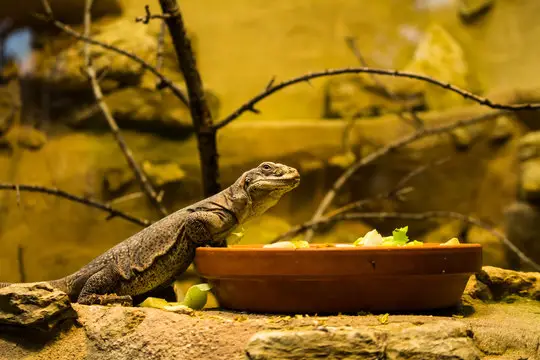
Iguanas are routine-oriented when it comes to food. Thus, once they are used to a specific type of food, it becomes difficult for them to try other food.
Thus, to prevent your iguana from having only one type of food, it would be best if you introduced a variety from the beginning.
Also, if you offer them one type of vegetable for an extended period, they may become bored and refuse to eat.
You can tell when your iguana is bored with its food if it refuses one type of food and eats another.
Also read: What Do Iguanas Eat? Best Foods For Baby And Adults Iguanas
The Food Has Gone Bad
It is unlikely to spoil unless you don’t pick the leftovers daily.
However, due to the high temperature and humidity in the iguana’s cage, it is likely for the vegetables and fruits to go stale.
It is imperative to remove the rotten food and replace it with fresh food in such cases.
Additionally, make sure to pick the uneaten food after a few hours to keep the iguana’s cage clean.
Over Handling Can Stress Out Your Iguana Pet
Stress makes iguanas vulnerable to any illnesses. And, lack of appetite is a common symptom for most ailments.
And, since iguanas are not typical handling fanatics. It is necessary not to handle them more than necessary.
Besides, if your iguana seems to be in a bad mood, it is better not to handle it as it can only cause stress.
Even so, iguanas act on instincts. Thus, they automatically bond with you if you make them feel comfortable and happy in their cage.
How Long Can Iguana Go Without Food?
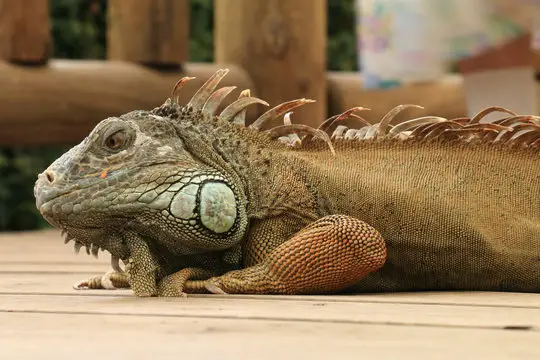
It is okay for your iguana to go for a few days without food. However, it depends on other factors such as age and health.
Because mature, healthy iguanas can go 1-2 weeks without food without any health issues. In contrast, baby and juvenile iguanas require more energy to grow and stay active.
Thus, keeping them without food for two weeks can be fatal.
Iguanas with health issues may also not survive for two weeks without food.
Therefore, you should not let your iguana stay without food for a while unless you are sure it cannot pose any health issue.
Naturally, it would be best if you feed your iguana at least two times a day. And, if it is inevitable to provide them daily, you should always ensure they are healthy and well hydrated.
To fully hydrate your iguana, you should offer them drinking water or mist their cage for up to 70-100%.
Otherwise, hunger plus dehydration can be deadly for iguanas.
How to Help Iguana Eat Again
Iguana refusing to eat can cause you stress, especially when you watch its health deteriorate.
Thus, it would be best to know what to do to make it feed again. First, find the underlying cause for your iguana to stop eating.
Secondly, you should solve the current problem by increasing the temperature if you find that your iguana cage is too cold.
Cases that Need To Force Your Iguana To Eat
Sometimes your iguana can be too weak to eat, especially if suffering from metabolic bone disease.
The disease makes iguanas bones weak, including the jaws challenging to chew.
In such a case, you should consider syringe feeding. Syringe feeding involves making a vegetable puree and then feeding it to your iguana using a syringe.
Additionally, the puree should be rich in calcium to help your iguana bones get strong again. These vegetables include kales, mustard greens, okra, turnip greens, and Bok Raab.
Diet for Anorexia Iguana
Anorexia is when your iguana has no feeding response or has lost appetite. Anorexia is not an illness but a symptom due to infectious or metabolic diseases.
Also, it can be due to improper husbandry or wrong feeding time may also cause anorexia.
In cases for iguanas that were previously feeding well, you should try different feeds until you get the proper meal for your iguana.
But, before trying different meals, you should ensure no underlying causes are making your iguana not to eat.
How to Feed Your Iguana (In case They Start Eating Again)
If your iguana seems to have lost too much weight after anorexia, it would be best if you added food that is high in protein and calories.
And, if your iguana cannot eat well, you should buy banana apple food for critical cases.
You should add water to the food to hydrate the iguana and read the instructions on the packet before feeding your iguana.
Oxbow Critical Care
- Designed specifically to support the needs of small herbivores
- Powdered formula - just add water
- High in fiber, no added sugar
- High palatability
Last update on 2022-12-30 / Affiliate links / Images from Amazon Product Advertising API
Nature Zone Snz54631 Iguana Bites Soft Moist Food, 9-Ounce
- Iguana Bites Is A Soft Moist Ready To Eat Food Designed For Green Iguanas
- These Small Bite Sized Soft Gel Foods Are Easy For The Reptile To Eat
- The Bite Contains Protein, Calcium And Essential Nutrients
- Specially Formulated Appetite Stimulating Color And Flavor
- Comes In 9-Ounce Size
Last update on 2022-12-30 / Affiliate links / Images from Amazon Product Advertising API
Final Sentences
Iguana not eating may be due to inadequate temperature, stress, breeding, illness, or even boredom with their diet.
Whatever the reason, it is imperative to find the underlying cause and rectify it as soon as possible.
And, if your iguana is gravid, you should not get overly worried unless the iguana seems weak and sick.
We hope you will keep your iguana happy and healthy with all these tips. All the best with your iguana.
